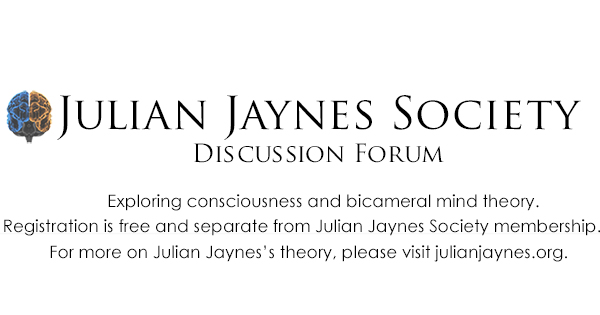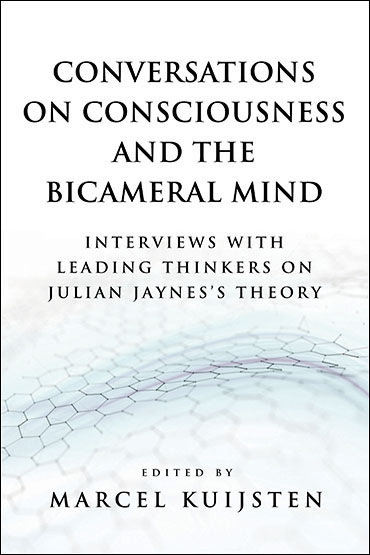Thank you for approving my membership this morning. This is my first post.
My research interest is in what I coined "brain skew", a term designating an imbalance in communication between the left and right sides of the brain. Appropriate to an investigation into the bicameral brain, brain skew left, where communication from the right brain to the left brain predominates, is associated with a personality that has trouble tolerating the feeling of guilt, understood as the conscientious or perfectionistic personality, in its more extreme forms known as Obsessive-Compulsive Personality Disorder or OCPD (not to be confused with OCD). This post will compare the mind of the bicameral man (as described by Jaynes) with the mind of a person with OCPD (OCPD which has a sizeable theoretical and clinical literature built up over more than the last 100 years).
To be clear, this is my own theory which I came up with in 1983 and have been fleshing out ever since. I've not published anything on it except for the odd internet post, and the poster mentioned below, which wasn't particularly well-received at the Congress. To be brief, my theory has never found a home anywhere and I doubt it ever will. Ideally I, like Jaynes did, would like to publish a book on my theory, but it's so far out there I don't have anything to relate it to and don't know where to start. Curiously I just happened to be reading JJ's book in February 1983 when I came up with the shame/guilt theory of brain skew, but didn't derive any bit of it from his book, but rather from books detailing the structure of shame and guilt. I did find his book rich in ideas, and exciting and inspiring as an apparently completely original work. For somewhat more information on brain skew see a PDF of the poster I presented at last year's Neuropsychoanalysis Congress:
http://brainskew.com/poster.pdf
So, a comparison of the minds of the bicameral man and the person who today has OCPD, as I'm supposing the brain organization of each is similar, marked by communication from the left to the right brain. Let me in a sloppy way group the comparisons into separate categories.
CONSCIOUSNESS
One with OCPD has a constricted consciousness. The metaphorical lay of the land his mind's eye sees, his internal "image space", is very small. It's said he "can't see the forest for the trees". Metaphorically, he sees one tree at a time. For him to shift his attention to another tree in the forest, he'd have to swap the old tree out, and the new tree in, which is a big deal, and time-consuming. Whereas most normal people are stepped back far enough to see the trees, and to shift attention from one tree to another requires little more than, metaphorically again, to just turn their head, from one part of their internal image-space to another. This reminds me a great deal of Jaynes' anecdote about the bicameral man driving a car. He's unaware. Completely wrapped up in driving. As an aside, despite his lack of mindfulness and sterile inner life, one with OCPD generally has fairly high intelligence. Brings to mind Jaynes' discussion of what is consciousness, and what tasks require it, if any.
THOUGHT
One with OCPD is driven almost entirely by his conscience, his superego ("over-I"). This is typically formed via internalizing one's parents' value systems. I heard of one case where the conscience of a woman with OCPD was actually in the voice of her mother. With OCPD these thoughts aren't auditory hallucinations, as if another person were speaking in the room, but they are experienced as something somehow outside of them, as part of an objective truth. Truth, rules, duty. Seeing oneself from an outside point of view of what's right, and correct. Like the Ten Commandments passed down from God to Moses and from Moses to his followers.
ACTION
One with OCPD typically makes a detailed plan, and then follows it precisely, step by step. There's little heed to the feedback the world gives him. It's like getting on a passenger train and going along for the ride. It's mindless. It's very robotic. Those with OCPD have been described as "living machines". If they can't figure out a plan perfectly in advance, they may not do anything, and suffer from "obsessive indecision", or "paralysis of the will". He lacks individual autonomy, agency, or will. He follows a structure, or rules, or else procrastinates, or even does nothing. This is like the bicameral man who, in a new situation, waits for instructions from the gods.
DELIBERATION
One with OCPD is nearly incapable of deliberating, of weighing various factors in his mind. He may take years to make a simple decision, which will rarely be based on some sound process. Metaphorically, more like if you set a coin on its edge, and someone walks in and slams a door, and the coin randomly falls to heads or tails. Then, once the decision is made, it's set in concrete. There's no deviating one way or another. The plan, or structure, is set, and unmodifiable. Again obvious comparisons to the bicameral man.
Thanks for this chance to get some ideas about brain skew out there. I'd forgotten how much Jaynes' bicameral man was like someone with OCPD. Both rather mind-blind. But it's so hard to apprehend the internal states of other people, you know? Good job on your founding and top-notch maintenance of a terrific site. I look forward to studying it more.
Brain Skew and the Bicameral Brain
Discussion of Julian Jaynes's second hypothesis - that before the development of consciousness, humans operated under a previous mentality called the bicameral mind.
Return to “2.0. Hypothesis Two: The Bicameral Mind”
Jump to
- JJS Forum
- ↳ General Discussion
- ↳ News Items Related to Jaynes's Theory
- ↳ Book Discussion: The Origin of Consciousness and Julian Jaynes Society Publications
- ↳ Myths, Misconceptions, and Fact Checks About Julian Jaynes's Theory
- ↳ Brian J. McVeigh's Random Thoughts
- ↳ Julian Jaynes
- ↳ Conferences, Events, and Local Discussion Groups
- ↳ Lecture Discussion
- ↳ Interview and Q&A Discussion
- ↳ 1.0. Hypothesis One: Consciousness Based On Language
- ↳ 1.01. Hypothesis One: Consciousness Based On Language | Subtopic: Consciousness & Dreams
- ↳ 1.02. Hypothesis One: Consciousness Based On Language | Subtopic: Consciousness in Children
- ↳ 1.03. Hypothesis One: Consciousness Based On Language | Subtopic: Consciousness and AI
- ↳ 2.0. Hypothesis Two: The Bicameral Mind
- ↳ 2.1. Hypothesis Two: The Bicameral Mind | Subtopic: Auditory Hallucinations in Normal Adults
- ↳ 2.2. Hypothesis Two: The Bicameral Mind | Subtopic: Hallucinations & Imaginary Companions in Children
- ↳ 2.3. Hypothesis Two: The Bicameral Mind | Subtopic: Hypnosis, Possession & Altered States of Consciousness
- ↳ 2.4. Hypothesis Two: The Bicameral Mind | Subtopic: Religion & the Bicameral Mind
- ↳ 2.5. Hypothesis Two: The Bicameral Mind | Subtopic: Schizophrenia
- ↳ 2.6. Hypothesis Two: The Bicameral Mind | Subtopic: The Mentality of Pre-Literate & Pre-Modern Peoples
- ↳ 3.0. Hypothesis Three: Dating the Development of Consciousness
- ↳ 4.0. Hypothesis Four: Jaynes's Neurological Model for the Bicameral Mind
- ↳ The Bicameral Mind in Fiction, Film & Popular Culture
- ↳ Information for Students


